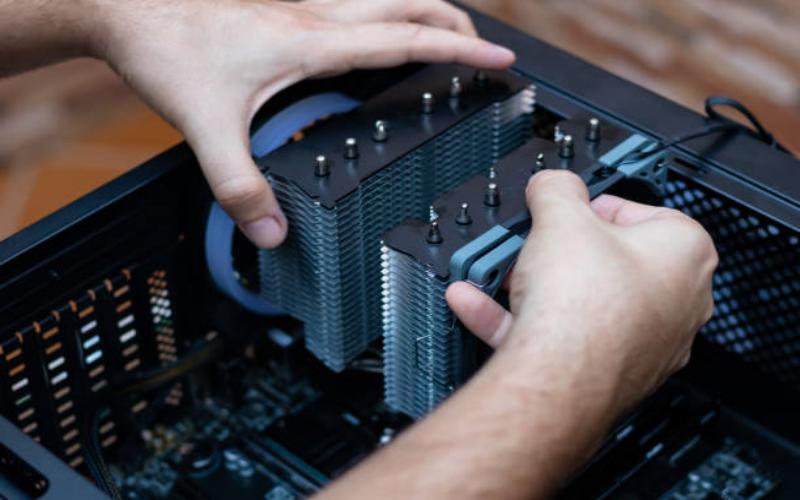The Importance of Heat Sinks in Electronic Devices
Heat sinks are essential components in electronic devices that help dissipate heat and prevent devices from overheating. They are widely used in various applications, including computers, smartphones, and industrial machinery. In this article, we will explore the advantages and disadvantages of heat sinks and understand their significance in keeping electronic devices functioning optimally.
Advantage 1: Efficient Heat Dissipation
One of the primary advantages of a heat sink is its ability to efficiently dissipate heat generated by electronic components. Heat sinks are usually made of materials with high thermal conductivity, such as aluminum or copper, which quickly absorb and transfer heat away from the device. This prevents the components from reaching high temperatures that could potentially damage them.
Advantage 2: Extended Device Lifespan
By effectively dissipating heat, heat sinks contribute to extending the lifespan of electronic devices. Excessive heat can cause component failures and reduce the overall reliability of the device. Heat sinks play a crucial role in maintaining optimal operating temperatures, ensuring the longevity of the device and preventing premature failures.
Advantage 3: Compact and Lightweight Design
Heat sinks are designed to be compact and lightweight, making them suitable for various electronic devices with limited space. Their small form factor allows for easy integration into devices without adding significant weight or bulkiness. This advantage is particularly important for portable devices such as laptops and smartphones, where space and weight constraints are critical.
Advantage 4: Cost-Effective Solution
Heat sinks provide a cost-effective solution for thermal management in electronic devices. Compared to other cooling methods such as liquid cooling or thermoelectric coolers, heat sinks are relatively inexpensive to manufacture and install. This makes them an attractive choice for mass-produced consumer electronics and industrial applications where cost efficiency is crucial.
Advantage 5: Versatility and Compatibility
Heat sinks are versatile and compatible with various electronic devices and components. They can be customized and designed to fit specific devices, ensuring efficient heat dissipation in different applications. This versatility allows heat sinks to be used in a wide range of industries, including automotive, aerospace, telecommunications, and more.
Disadvantage 1: Limited Cooling Capacity
Despite their effectiveness, heat sinks have a limited cooling capacity. They can only dissipate heat to the surrounding environment, relying on air or other cooling mechanisms to carry away the heat. In high-power applications or environments with poor airflow, heat sinks may not be sufficient to keep the device within the desired temperature range.
Disadvantage 2: Dependency on External Factors
Heat sinks' performance is dependent on external factors such as ambient temperature and airflow. In environments with high ambient temperatures or restricted airflow, the effectiveness of heat sinks may be compromised. Additional cooling methods or measures may be required to maintain optimal operating temperatures in such conditions.
Disadvantage 3: Limited Effectiveness for Small Devices
Heat sinks may not be as effective in cooling small electronic devices with limited surface area. The size and design constraints of these devices may limit the installation of a large enough heat sink to dissipate heat adequately. In such cases, alternative cooling methods, such as heat pipes or micro fans, may be more suitable.
Disadvantage 4: Incompatibility with Certain Components
Heat sinks may not be compatible with certain electronic components that are sensitive to temperature changes or require insulation. The direct contact between the component and the heat sink can affect the component's performance or introduce electrical interference. In these cases, alternative cooling solutions, such as phase change materials or thermoelectric coolers, may be required.
Disadvantage 5: Maintenance and Cleaning
Heat sinks, like any other component, require regular maintenance and cleaning to ensure optimal performance. Over time, dust and debris can accumulate on the heat sink fins, reducing their effectiveness in dissipating heat. Periodic cleaning and proper maintenance are necessary to prevent heat sinks from becoming clogged and to maintain their efficiency.
heat sink advantages, heat sink disadvantages, heat sink importance, heat sink efficiency, heat sink lifespan, heat sink design, heat sink cost, heat sink versatility, heat sink compatibility, heat sink cooling capacity, heat sink external factors, heat sink limitations, heat sink small devices, heat sink component compatibility, heat sink maintenance The Advantages and Disadvantages of Heat Sinks: Explained Discover the advantages and disadvantages of heat sinks in electronic devices. Learn how heat sinks efficiently dissipate heat, extend device lifespans, and more.

